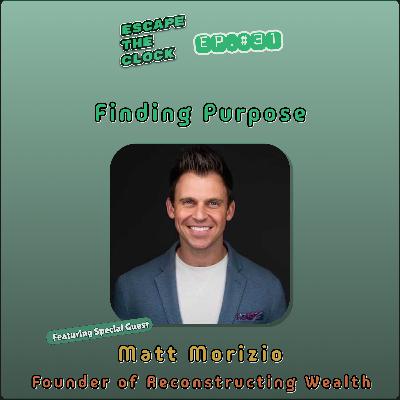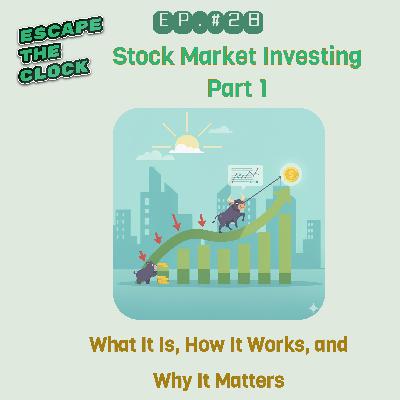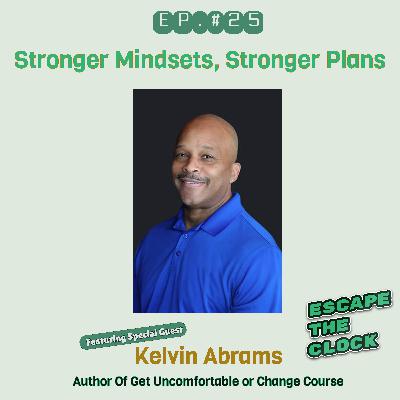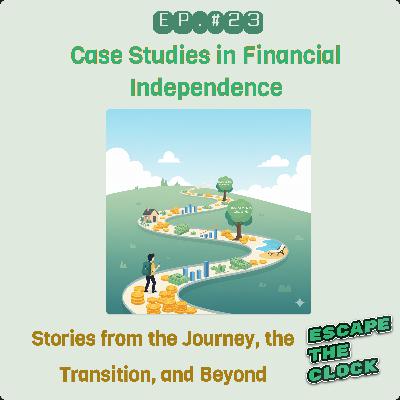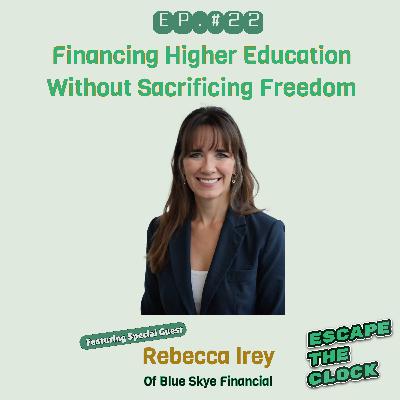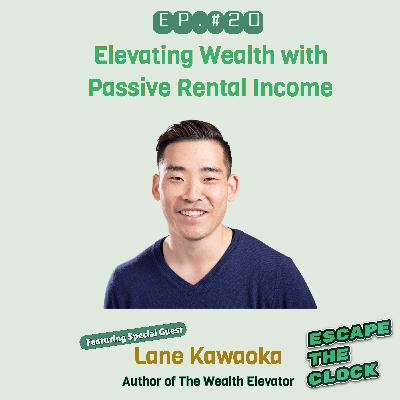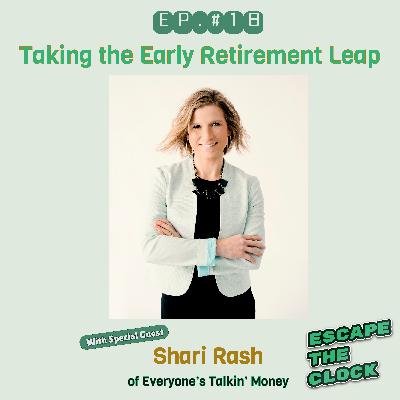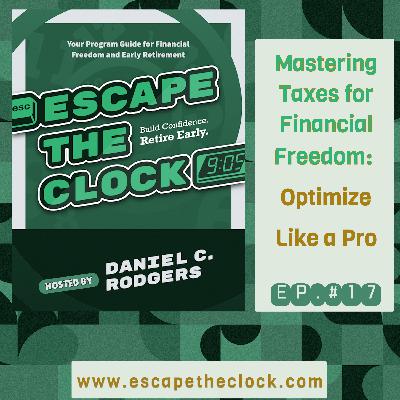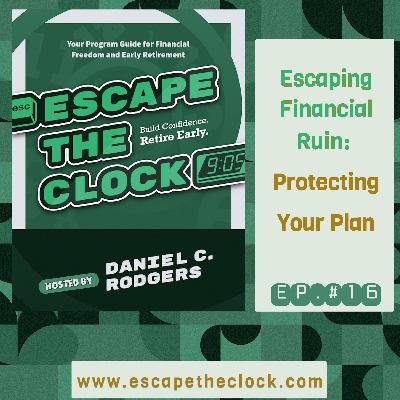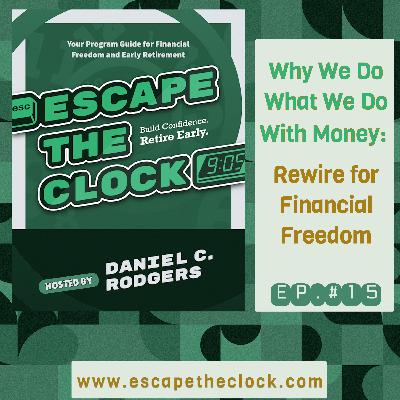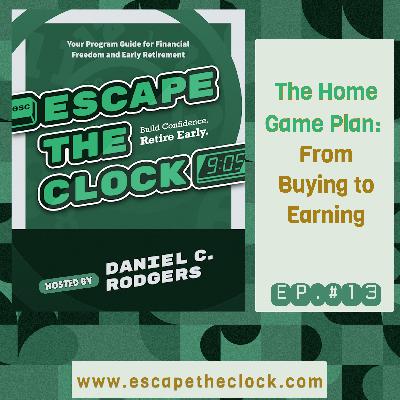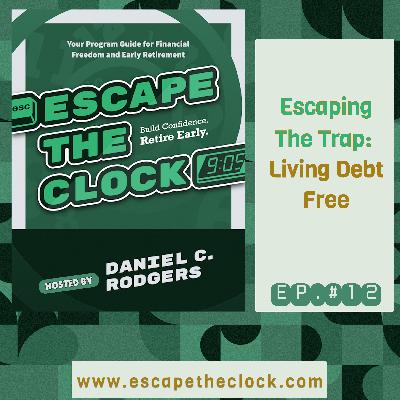Discover Escape The Clock: How to Become Financially Free and Have the Option Not to Work
Escape The Clock: How to Become Financially Free and Have the Option Not to Work

Escape The Clock: How to Become Financially Free and Have the Option Not to Work
Author: Daniel C. Rodgers
Subscribed: 3Played: 41Subscribe
Share
© 2025 Daniel C. Rodgers - Escape The Clock - All Rights Reserved
Description
Join me, Daniel C. Rodgers, the author of the award-winning book Escape The Clock, where I break down the strategies from the book to help you make the moves you need to make to get in control of your finances and achieve financial independence.
These 30-60 minute long episodes are focused on bite-size and easy to understand strategies to get the most out of your money so that you can have the option to work (or not work) on your terms.
For the book, the planner, and more free resources, please visit www.escapetheclock.com.
31 Episodes
Reverse
Why are you working as hard as you are? What is your purpose?In this episode, former professional baseball player turned wealth coach Matt Morizio, founder of Reconstructing Wealth, joins Dan to explore how purpose transforms not just your financial plan, but your life. Together, they discuss how to detach from money emotionally, build value-aligned goals, and lead with meaning in both wealth and family life.Key Talking Points:Why financial freedom without purpose often feels emptyHow detaching from money can reduce anxiety and build real independenceWhy your “why” is usually a who — and how to find itHow values-based planning creates resilience through financial setbacksBalancing purpose across relationships, marriage, and familyThe shift from chasing success to building significanceEscape The Clock Resources:The Book: www.escapetheclock.com/bookThe Planner: www.escapetheclock.com/planner1:1 Help: www.escapetheclock.com/scheduleOther Resources: www.escapetheclock.com/resourcesFree Weekly Newsletter: https://bit.ly/etc-newsEpisode References/Resources:80% of Americans lack a clear sense of purpose in their financial life — Edward Jones & Age Wave (2023)Only 36% of U.S. adults have a written long-term financial plan — Charles Schwab (2024)7 in 10 families experience a major financial setback every 10 years — Federal Reserve (2023)Connect with Jaden:Website: www.reconstructingwealth.com Instagram: @mattmorizioFree Course: DM Matt on Instagram or visitreconstructingwealth.comListener Offer!As mentioned in the episode, in support of the show Matt Morizio is offering his three part education videos directly to you for free. Just reach out to him on Instagram at @mattmorizio.Support the podcast:Subscribe/Follow on your favorite platform.Leave a rating & review.Share this episode with others.Support me by picking up the book atwww.escapetheclock.com/book.Thank you for listening!This information is for educational purposes only and not financial advice. Consult a qualified professional for personalized guidance.
Decision paralysis costs investors real money. In this episode, Jaden Sterling, CEO of Sterling Stock Picker, joins Daniel to unpack how everyday investors can use transparent, data-driven tools to make smarter buy, sell, and hold decisions while staying disciplined for long-term freedom.Key Talking Points:How emotions prevent us from making smart stock investments.How data-driven tools can support smarter long-term choices.The role of AI in stock picking today and in the future.The importance of transparency and education in building investor confidence.How to balance technology with human judgment.What financial freedom looks like beyond Wall Street.Escape The Clock Resources:The Book: www.escapetheclock.com/bookThe Planner: www.escapetheclock.com/planner1:1 Help: www.escapetheclock.com/scheduleOther Resources: www.escapetheclock.com/resourcesFree Weekly Newsletter: https://bit.ly/etc-newsEpisode References/Resources:60% of Americans own stocks — Gallup (2025)71% want transparency into why recommendations are made - Morningstar (2023)Connect with Jaden:Website: sterlingstockpicker.comBook: Alchemy of True SuccessLinkedIn: linkedin.com/in/jadensterlingYouTube: youtube.com/@SterlingStockPickerEmail: media-relations@sterlingstockpicker.comListener Offer!Sterling Stock Picker is 30% off for Escape The Clock listeners. Sign up through the VIP dashboard mentioned in the episode.Support the podcast:Subscribe or follow on your favorite platform.Leave a rating and review.Share this episode with someone who wants to earn more from their investments.Support me by picking up the book at www.escapetheclock.com/book.Thank you for listening!This information is for educational purposes only and not financial advice. Consult a qualified professional for personalized guidance.
Most people think the only way to make money in the stock market is by buying low and selling high, but that’s only half the story.In this episode, Dan reveals powerful ways to generate income from the shares you already own. You’ll learn how to glide toward retirement safely, earn passive income through dividends and stock lending, beat inflation with smarter interest-rate strategies, and even use conservative stock-option techniques to turn your patience into cash flow.Key Talking Points:Why nearly 60 % of Americans own stocks but most never learn the other ways to profit.How glide-path investing protects growth and smooths the transition from work to retirement.Creating early cash flow through dividend reinvestment and stock lending.Beating inflation with HYSAs, TIPS, and CD-ladder strategies.Generating steady income through covered calls, cash-secured puts, and the Wheel strategy.How to move from investor to architect by designing a portfolio that funds your freedom.Escape The Clock Resources:The Book: www.escapetheclock.com/bookThe Planner: www.escapetheclock.com/planner1:1 Help: www.escapetheclock.com/scheduleOther Resources: www.escapetheclock.com/resourcesFree Weekly Newsletter: https://bit.ly/etc-newsEpisode References/Resources:60% of Americans own stocks — Gallup (2025)Gold prices historically rise during high inflation periods — Macrotrends (2025)Support the podcast:Subscribe or follow on your favorite platform.Leave a rating and review.Share this episode with someone who wants to earn more from their investments.Support me by picking up the book at www.escapetheclock.com/book.Thank you for listening!This information is for educational purposes only and not financial advice. Consult a qualified professional for personalized guidance.
The stock market doesn’t have to be intimidating.Only about 58% of Americans own any stocks, and many who don’t say it’s because the market feels too risky or confusing. But the truth is, investing isn’t gambling; it’s ownership.In this episode, Dan explains what the stock market really is, how it works, and why understanding it can transform how you build wealth and achieve financial freedom.Key Talking Points:Introduction to the stock market, how it began, and why prices move.The three types of stocks—growth, value, and dividend—and how they fit together in a portfolio.What ETFs are and why they make investing easier and more diversified.The power of compounding returns and long-term patience.How taxes impact short-term and long-term investing decisions.Practical steps to start investing and build your financial freedom plan.Escape The Clock Resources:The Book: www.escapetheclock.com/bookThe Planner: www.escapetheclock.com/planner1:1 Help: www.escapetheclock.com/scheduleOther Resources: www.escapetheclock.com/resourcesFree Weekly Newsletter: https://bit.ly/etc-newsEpisode References/Resources:58% of Americans own stocks — Gallup (2024)Only 1% of day traders consistently profit over five years, 13% profit over six months, 72% lose money, and 40% quit within a month — Berkeley Haas (2019)The S&P 500 has averaged roughly 10% annual returns over the long term — NYU Stern (2024)Long-term investors outperform short-term traders by an average of 6% — Columbia Business School (2020)Support the podcast:Subscribe/Follow on your favorite platform.Leave a rating & review.Share this episode with others.Support me by picking up the book for yourself or a loved one atwww.escapetheclock.com/book.Thank you for listening and your support!Please note: This information is for educational purposes only and not financial advice. Consult a qualified professional for personalized guidance.
Can you really build wealth with no money down?In this episode of Escape The Clock, Dan sits down with David Webb, founder of No Money Millionaire, to explore how everyday investors can get started in real estate without massive savings or traditional financing.David breaks down how to leverage Other People’s Money (OPM) responsibly, and shows why creative real estate deals can open doors for anyone willing to do the homework and follow through.From building partnerships and earning trust to structuring deals that align with your strengths, this conversation will change how you think about real estate investing and the possibilities within your reach.Key Talking Points:Why you don’t always need a large down payment to start investing in real estate.How OPM (Other People’s Money) works.Creative deal structures and “no money down” strategies.The importance of slowing down to stabilize before scaling up.Turning first partnerships into lifelong business connections.Finding potential partners through real estate meetups, mixers, and online communities.How home equity (HELOCs) can unlock opportunities for joint ventures.The importance of transparency and follow-through in maintaining trust.Episode Sources:60% Feel Too Broke to Invest — CNBC/Momentive (2024)1 in 5 Real Estate Investors Used Creative Financing for Their First Deal — ATTOM Data (2024)First-Time Investors Wait 6–8 Years Longer Than Planned — BiggerPockets (2023)Escape The Clock Resources:The Book: www.escapetheclock.com/bookThe Planner: www.escapetheclock.com/planner1:1 Help: www.escapetheclock.com/scheduleOther Resources: www.escapetheclock.com/resourcesFree Weekly Newsletter: https://bit.ly/etc-newsConnect with David:Website: www.thenomonymillionaire.com Book: The No Money Millionaire™ on AmazonYouTube: No Money Millionaire ChannelLinkedIn: David WebbInstagram: @thenomonymillionaireContact: info@thenomonymillionaire.comSubscribe, rate, review, share this episode, or support by getting the book at www.escapetheclock.com/book.Please note: This information is for educational purposes only and not financial advice. Consult a qualified professional for personalized guidance.
Are your beliefs about money quietly shaping your life? In this episode of Escape The Clock, Dan sits down with Pericles Rellas, a money mindset expert and the founder of Reset Your Financial Thermostat, to explore how our subconscious beliefs about money shape our financial behaviors, and how we can reset them to create abundance, freedom, and intentional growth.Pericles shares how old money scripts, emotional blocks, and comfort zones act like a thermostat — limiting or amplifying our financial potential — and offers practical steps to rewrite those scripts, celebrate progress, and align spending with what truly matters.Key Talking Points:Understanding the “financial thermostat” and how it sets your comfort zone with money.How upbringing, emotions, and past experiences shape your money mindset.Recognizing and rewriting limiting money scripts.The role of small wins and daily reminders in resetting your financial thermostat.Why setbacks are part of growth, and how to maintain progress through life’s challenges.Reframing financial independence: from deprivation to alignment and intentionality.How modeling positive money behaviors can help others reset their mindset.Escape The Clock Resources:The Book: www.escapetheclock.com/bookThe Planner: www.escapetheclock.com/planner1:1 Help: www.escapetheclock.com/scheduleOther Resources: www.escapetheclock.com/resourcesFree Weekly Newsletter: https://bit.ly/etc-newsConnect with Pericles:Website: resetyourfinancialthermostat.comInstagram: @ResetYourFinancialThermostatNewsletter/Resources: resetyourfinancialthermostat.com/newsletterSubscribe, rate, review, share this episode, or support by getting the book at www.escapetheclock.com/book.Please note: This information is for educational purposes only and not financial advice. Consult a qualified professional for personalized guidance.
Ever wonder how to prepare your finances for the next crisis? In this episode of Escape The Clock, Dan sits down with Kelvin Abrams, entrepreneur and author of Get Uncomfortable or Change Course, to explore how to prepare for the unexpected and thrive through financial adversity.From layoffs and market crashes to everyday setbacks, Kelvin shares how resilience, adaptability, and a willingness to get uncomfortable can strengthen your financial future.Key Talking Points:How to prepare your financial plan for the unknown.The “Learn, Earn, Return” framework for staying resilient.Why discomfort and adaptability are vital for long-term success.How mindset, not math, drives consistency and calm in hard times.Lessons in diversification, balance, and sustainable growth.Practical steps to make your plan more resilient today.Escape The Clock Resources:The Book: www.escapetheclock.com/bookThe Planner: www.escapetheclock.com/planner1:1 Help: www.escapetheclock.com/scheduleOther Resources: www.escapetheclock.com/resourcesFree Weekly Newsletter: https://bit.ly/etc-newsEpisode References & Resources:Nearly 40% of Americans would struggle to cover a $400 emergency expense — Federal Reserve, Economic Well-Being of U.S. Households (2023)Nearly 60% of U.S. adults live paycheck to paycheck — LendingClub, Paycheck-to-Paycheck Report (2024)Those who consistently save at least 15% of income are on track for retirement, while most Americans save under 8% — Fidelity, Retirement Savings Guidelines (2023)Investors who pulled out during downturns underperformed by 1–2% annually compared to those who stayed invested — Vanguard, Investor Behavior Study (2022)Connect with Kelvin:Website: kelvinabrams.comBook: Get Uncomfortable or Change CourseLinkedIn: Kelvin AbramsInstagram: @kelvinabramsSubscribe, rate, review, share this episode, or support by getting the book at www.escapetheclock.com/book.Please note: This information is for educational purposes only and not financial advice. Consult a qualified professional for personalized guidance.
Everyone makes financial decisions, but not all choices are purely rational. In this episode of Escape The Clock, I speak with Hugh Massie, founder and CEO of DNA Behavior International, about how our natural behavioral tendencies influence the way we earn, spend, save, and invest.We explore the concept of Behavioral DNA, how hardwired traits affect decision-making under pressure, and practical strategies to align your financial plan with your instincts. Whether you want to make smarter investments, reduce financial stress, or understand your own biases, this episode gives actionable insights to leverage your behavior for better financial outcomes.Key Talking Points:The Hidden Force in Finance – Why instinct and behavioral biases can impact every money decision.Understanding Behavioral DNA – How your natural traits shape risk tolerance, spending, and investment choices.Common Biases to Watch – Overconfidence, loss aversion, herd behavior, and their effect on financial outcomes.Aligning Strategy with Behavior – Personalizing financial planning, savings, and investment approaches to your tendencies.Practical Advice – Steps to increase awareness of your patterns, make smarter choices, and improve financial literacy.Escape The Clock Resources:The Book: www.escapetheclock.com/bookThe Planner: www.escapetheclock.com/planner1:1 Help: www.escapetheclock.com/scheduleOther Resources: www.escapetheclock.com/resourcesFree Weekly Newsletter: https://bit.ly/etc-newsEpisode References & Resources:85% of people say money-related stress affects their lives – APA, Stress in America (2023)$1,000 per person per year lost due to financial illiteracy – National Financial Educators Council (NFEC)$240 billion annually lost in the U.S. economy from poor financial decisions – National Financial Educators Council (NFEC)Connect with Hugh:On the Web: www.dnabehavior.comLinkedIn: https://www.linkedin.com/in/hughmassie/Instagram: @HughMassieYouTube: DNA BehaviorSubscribe, rate, review, share this episode, or support by getting the book at www.escapetheclock.com/book.Please note: This information is for educational purposes only and not financial advice. Consult a qualified professional for personalized guidance.
Three powerful real-life stories of financial independence. You’ll hear from Brad, who’s in the trenches of building toward FI; Francis, who’s just crossed the line and is beginning the transition into a new life chapter; and David, a seasoned retiree reflecting on lessons learned from a lifetime of financial choices.These case studies highlight the realities, challenges, and rewards of financial independence at every stage of the journey. Whether you’re just getting started, midway through, or already retired, you’ll walk away with insights and strategies you can apply to your own path toward freedom.Key Talking Points:Real-life testimonials from three people at different stages of financial independence.Insights from their journeys that show why anyone can pursue FI.What it takes to reach your FI number and how to prepare for the transition.Lessons from those already retired and living with financial freedom.Common threads across all three stories — discipline, mindset shifts, and adaptability.Escape The Clock Resources:The Book: www.escapetheclock.com/bookThe Planner: www.escapetheclock.com/planner1:1 Help: www.escapetheclock.com/scheduleOther Resources: www.escapetheclock.com/resourcesFree Weekly Newsletter: https://bit.ly/etc-newsSubscribe, rate, review, share this episode, or support by getting the book at www.escapetheclock.com/book.Please note: This information is for educational purposes only and not financial advice. Consult a qualified professional for personalized guidance.
College costs are rising, leaving families stretched and students with long-term debt. In this episode of Escape The Clock, I talk with Rebecca Irey, founder of Blue Skye Financial, about practical strategies to plan smarter, reduce stress, and make college more affordable.We cover 529 plans, scholarships, community college, and involving kids in the process to help families cover costs without sacrificing financial freedom. Whether your child is years from college or already applying, this episode gives actionable steps to avoid the college debt trap.Key Talking Points:The Rising Price Tag – Why tuition and student debt threaten both family finances and future freedom.Funding Smarter – Leveraging 529 plans, FAFSA, and grants to reduce reliance on loans.Alternative Pathways – Community college, scholarships, insurance plans, and employer programs that cut costs without cutting quality.Shared Responsibility – How involving kids in the process reduces stress and builds financial awareness.Practical Steps – Actionable strategies families can take now to make higher education more affordable.Escape The Clock Resources:The Book: www.escapetheclock.com/bookThe Planner: www.escapetheclock.com/planner1:1 Help: www.escapetheclock.com/scheduleOther Resources: www.escapetheclock.com/resourcesFree Weekly Newsletter: https://bit.ly/etc-newsEpisode References & Resources:Tuition at public universities has risen 180% over the past 20 years – College BoardOutstanding U.S. student loan debt exceeds $1.7 trillion – Federal ReserveMore than $3 billion in Pell Grants went unclaimed in 2023 – National College Attainment NetworkNearly 40% of students attend community college at some point – National Center for Education StatisticsConnect with Rebecca:On the Web: www.blueskyefinancial.com Instagram: @blueskye_financial LinkedIn: Blue Skye BusinessFacebook: Blue Skye FinancialSubscribe, rate, review, share this episode, or support by getting the book at www.escapetheclock.com/book.Please note: This information is for educational purposes only and not financial advice. Consult a qualified professional for personalized guidance.
In this episode, Cosmos Dar joins us to explore aligning financial decisions with values, from ESG investing and systemic barriers to practical strategies for overcoming biases and taking control of your money.Key Talking Points:The ESG Wave – Why environmental, social, and governance investing is growing rapidly.Values vs. Reality – The gap between ethical intentions and financial behavior.Systemic Barriers – How predatory lending and structural inequities impact financial freedom.Psychology of Money – Understanding cognitive biases and how self-efficacy can empower better financial decisions.Taking Action – Practical steps to integrate ethical choices into their financial plans, even within imperfect systems.Escape The Clock Resources:The Book: www.escapetheclock.com/bookThe Planner: www.escapetheclock.com/planner1:1 Help: www.escapetheclock.com/scheduleOther Resources: www.escapetheclock.com/resourcesFree Weekly Newsletter: https://bit.ly/etc-newsEpisode References & Resources:Stats on ESG, sustainable investing, and values-aligned choices – Broadridge, Morgan Stanley, Small Business Trends56% of Americans stop buying unethical brands – MintelEthical banks ROE 5.23% – Fondazione Finanza Etica68% of investors unsure how to invest with values – NerdWalletPredatory lending costs $25B annually – MagnifyMoneyConnect with Cosmos:On the Web: cosmosdar.comPodcast: Extraordinary AmericaSubscribe, review, share, or support via www.escapetheclock.com/book.Please note: This information is for educational purposes only and not financial advice. Consult a qualified professional for personalized guidance.
Lane Kawaoka, two-time bestselling author of The Wealth Elevator and seasoned real estate investor, joins me to share how his framework helps everyday people build passive income through real estate. We talk about getting started with that very first investment, scaling from active to passive income, and the steps needed to protect and preserve wealth for the long term.Key Talking Points:The Wealth Elevator: A framework for moving step by step toward financial freedom.From active to passive: Turning rental income into lasting cash flow.Scaling up: Why syndications open the door to bigger opportunities.The Penthouse: Knowing when you’re ready to replace your 9-to-5 with passive income.Building legacy: Protecting wealth and creating generational impact.www.EscapeTheClock.com Resources:The BookThe Planner1:1 HelpOther ResourcesFree Weekly NewsletterEpisode References & Resources:59% of Americans can't cover a $1,000 emergency expense - CBS NewsOver 70% of millionaires own real estate - LuxWisp70% of wealthy families lose their wealth by the second generation; 90% by the third - Preserve YoursConnect with Lane:On the Web: thewealthelevator.comJoin the Club: thewealthelevator.com/clubEvents & Networking: thewealthelevator.com/eventsYouTube: Lane KawaokaSupport the podcast:Subscribe/Follow on your favorite platformLeave a rating & reviewShare this episode with othersSupport me by picking up the book for yourself or a loved one at: www.escapetheclock.com/bookThank you for listening!Please note: This information is for educational purposes only and not financial advice. Consult a qualified professional for personalized guidance.
Financial freedom is often measured in dollars and years, yet the real payoff comes from the health, relationships, experiences, and joy we cultivate along the way. Using practical projects, I guide you on how to prioritize your physical and mental well-being, strengthen social ties, pursue meaningful adventures, and make intentional, high-utility spending decisions.This episode is all about turning your financial plan into a tool to maximize daily happiness, so you can enjoy life today, not just at retirement.Key Talking Points:Redefining wealth: Why happiness, health, and relationships are the ultimate returns.Health as a dividend: Setting goals, managing risks, and investing in both physical and mental wellness.Strengthening social ties: Prioritizing family, friends, and meaningful connections.Experiences over things: How travel, adventure, and high-utility spending drive lasting joy.Integrating happiness into your financial plan: Making joy part of the journey, not just the destination.Escape The Clock Resources:The Book: www.escapetheclock.com/book The Planner: www.escapetheclock.com/planner 1:1 Help: www.escapetheclock.com/scheduleOther Resources: www.escapetheclock.com/resourcesFree Weekly Newsletter: https://bit.ly/etc-newsEpisode References & Resources:Pew Research – Loneliness Among Young AdultsWorld Happiness Report – Sharing Meals & Life SatisfactionHarvard Kennedy School – Loneliness in AmericaSupport the podcast:Subscribe/Follow on your favorite platform.Leave a rating & review.Share this episode with others.Support me by picking up the book for yourself or a loved one at www.escapetheclock.com/book.Thank you for listening!Please note: This information is for educational purposes only and not financial advice. Consult a qualified professional for personalized guidance.
If you’ve ever wondered whether early retirement is right for you, this episode is a must-listen. I sit down with Shari Rash of Everyone’s Talking Money to explore the mindset, financial strategies, and emotional readiness for leaving the traditional workforce, creating a purposeful escape plan, and thriving once free.Key Talking Points:Defining early retirement: What it really means today, and how to know if it’s right for you.Financial preparation: Calculating your “enough” number, managing risk, and building multiple income streams.Mental and emotional readiness: Avoiding post-retirement drift, maintaining purpose, and strengthening resilience.Living with purpose: Using your newfound time for growth, contribution, and fulfillment.Shari’s advice for taking the leap: Mindset shifts, common fears, and practical strategies for a smooth transition.Episode References & Resources:Average Retirement Age in the U.S. – Motley FoolRetirement Savings Gaps – AARPHealthcare Costs for Retirees – KiplingerEarly Retirement Realities – InvestopediaDepression Risk Among Early Retirees – ScienceDirectUnderestimating Non-Financial Aspects – NBC ChicagoImportance of Social Connections – SpringerBenefits of Volunteering – VolunteerHubConnect with Shari:InstagramWebsite | GWA WealthEveryone’s Talkin’ Money on Apple | SpotifyExplore Escape The Clock Resources:www.escapetheclock.com for the book, videos, and 1:1 help.Free Weekly Newsletter at https://bit.ly/etc-news.Please note: This information is for educational purposes only and not financial advice. Consult a qualified professional for personalized guidance.
Taxes are often seen as a burden, but they can actually be one of your most powerful tools on the path to financial independence. In this episode, I break down four practical tax strategies that anyone can start using today to optimize their tax bill, save money, and accelerate early retirement goals.From understanding tax brackets and capital gains rules to mastering retirement account withdrawals and side hustle deductions, you’ll learn how to take control of your tax situation rather than letting it control you.Whether you’re still working or already retired, these projects will help you minimize lifetime taxes, create tax-efficient income streams, and build a smarter financial freedom plan.Key Talking Points:Why knowing your actual tax bracket can save you thousands and how to strategically manage income across your lifetime.How tax-loss and tax-gain harvesting can reduce your capital gains tax and increase investment flexibility.The importance of Roth conversions and withdrawal strategies to minimize taxes on retirement income and required minimum distributions.How treating side hustles like a business can unlock tax deductions and special retirement savings options.Practical tips on withholding, deductions, charitable giving, and using donor-advised funds to maximize tax benefits.Avoiding common pitfalls like the wash-sale rule and understanding Medicare surcharge triggers.Episode References & Resources:IRS Tax Brackets and Standard Deduction Tables - IRS.govInvestopedia on Tax-Loss Harvesting - https://www.investopedia.com/terms/t/taxlossharvesting.aspIRS Publication on Retirement Plans - https://www.irs.gov/retirement-plansSolo 401(k) and SEP IRA basics - https://www.irs.gov/retirement-plans/plan-sponsor/solo-401k-planExplore Escape The Clock Resources:The Book: www.escapetheclock.com/bookThe Planner: www.escapetheclock.com/planner1:1 Help: www.escapetheclock.com/scheduleFree Weekly Newsletter: https://bit.ly/etc-newsSupport the podcast:Subscribe & follow on your favorite platformLeave a rating or reviewShare this episodeGrab a copy of the book: www.escapetheclock.com/bookThank you for listening!Please note: This information is for educational purposes only and not financial advice. Consult a qualified professional for personalized guidance.
Do you ever worry about a financial disaster derailing your plans? A market crash, job loss, or medical emergency can drain your savings, max out your credit, and force you to pull from retirement accounts early, potentially setting your timeline back by years.In this episode, I tackle how to build resilience into your financial independence plan. From emergency reserves to income diversification and system redundancies, I’ll show you how to mitigate the risks that can lead to financial ruin.Financial freedom isn’t just about growth—it’s about durability. You’ll learn how to think like a program manager, anticipate failure points, and prepare for worst-case scenarios before they happen.Key Talking Points:Why risk planning is critical, not optional, especially in uncertain times.Pre‑mortem technique: imagining failure before it happens to identify risk and build contingencies in advance.Post‑mortem technique: learning from setbacks, like what went wrong, why, and what to do next.Applying these tools to financial risks: markets, income, health, assets, relationships.Importance of diversification, redundancy, stress‑testing your financial buffer.Building layered buffer systems: emergency fund, income alternatives, insurance, legal protections.Behavioral guardrails: systems to limit impulsive spending or risky decision-making.How to think and act like a professional risk manager in your own life.Episode References & Resources:“Worst Crisis Since ‘30s, With No End Yet in Sight” – The Wall Street Journal https://www.wsj.com/articles/SB122169431617549947““Subprime Mortgage Meltdown and Its Role in Triggering the Great Recession” – Investopediahttps://www.investopedia.com/terms/s/subprime-meltdown.aspExplore Escape The Clock Resources:The Book: www.escapetheclock.com/bookThe Planner: www.escapetheclock.com/planner1:1 Help: www.escapetheclock.com/scheduleFree Weekly Newsletter: https://bit.ly/etc-newsSupport the podcast:Subscribe & follow on your favorite platformLeave a rating or reviewShare this episodeGrab a copy of the book: www.escapetheclock.com/bookThank you for listening!Please note: This information is for educational purposes only and not financial advice. Consult a qualified professional for personalized guidance.
Are your financial goals stuck? You know what to do with money, but doing it is the hard part. The biggest obstacle isn’t your income or the market—it’s your own mind.In this episode, I'll break down the hidden behaviors and beliefs that drive your financial decisions. From Scarcity Mindset and Dual-Self Theory to unconscious Money Scripts, you’ll see how mental traps like Loss Aversion and the Sunk Cost Fallacy quietly hold you back.The good news? You can build a money strategy that works with your brain. Learn how to activate your rational side, align your goals with your values, and create systems that stick. It’s time to rewire your mindset and take control of your financial future.Key Talking Points:How emotion, identity, and behavior influence your financial decisions.Escaping scarcity and why “tunneling” limits your planning, and how to create mental space.Training your brain for long-term rewards over short-term impulses.Identifying and shifting unconscious money scripts for real change.Tools to counter Loss Aversion, Sunk Cost, Endowment, Anchoring, and Status Quo Bias.Using Vision, Values, and Velocity to create a strategy that builds traction.Building systems that make positive habits automatic.Episode References & Resources:Thinking, Fast and Slow by Daniel Kahneman (2011)Prospect Theory by Amos Tversky & Daniel Kahneman (1979)Mind Over Money by Brad & Ted Klontz (2009)Scarcity by Sendhil Mullainathan & Eldar Shafir (2013)Toward a Positive Theory of Consumer Choice by Richard Thaler (1980)Status Quo Bias in Decision Making by Samuelson & Zeckhauser (1988)The Strategic Interaction of Successive Motivational States by George Ainslie (1992)The Psychology of Sunk Cost by Arkes & Blumer (1985)Explore Escape The Clock Resources:The Book: www.escapetheclock.com/bookThe Planner: www.escapetheclock.com/planner1:1 Help: www.escapetheclock.com/scheduleFree Weekly Newsletter: https://bit.ly/etc-newsSupport the podcast:Subscribe & follow on your favorite platformLeave a rating or reviewShare this episodeGrab a copy of the book: www.escapetheclock.com/bookThank you for listening!Please note: This information is for educational purposes only and not financial advice. Consult a qualified professional for personalized guidance.
In this episode of Escape The Clock, we’re diving into the financial realities of raising a family and how to do it with intention. From diapers to diplomas, the costs can be staggering, but with the right strategies, they don’t have to derail your financial independence goals.I’ll walk you through the key phases of family financial planning. From estimating the cost of raising a child to securing your family’s future through insurance, college savings, and estate planning. Whether you're already a parent or planning ahead, this episode will give you a roadmap to support your loved ones while staying on track toward your own dreams.If you want to raise a strong family and build a strong financial future, this episode is your blueprint.Key Talking Points:The real cost of raising a child – How it’s grown to over $286,000 (not including college), and how to budget for the different life stages.Financial priorities shift with children – Why your saving, spending, and risk tolerance may all need to evolve.Emergency funds, estate, and insurance – How to protect your family with the right coverage and cash reserves.College savings strategies – 529 plans, gifting options, and using compounding interest to your advantage.Legacy planning – Wills, trusts, and guardianship planning to protect your kids and your assets.Who’s paying for college these days? – A look at the data and what it means for your own family game plan.Balancing support and independence – Helping your kids without sacrificing your own financial future.Teaching your kids about money – Practical ideas to raise financially literate children.Explore Escape The Clock Resources:Book: www.escapetheclock.com/bookPlanner: www.escapetheclock.com/plannerVideos: www.escapetheclock.com/mediaConsultation: www.escapetheclock.com/scheduleOther Resources: www.escapetheclock.com/resourcesJoin the Newsletter: https://bit.ly/etc-newsSupport the podcast:Subscribe/Follow on your favorite platform.Leave a rating & review.Share this episode with others.Support me by picking up the book for yourself or a loved one at www.escapetheclock.com/book.Thank you for listening!Please note: This information is for educational purposes only and not financial advice. Consult a qualified professional for personalized guidance.
In this episode of Escape The Clock, I break down how to make housing a productive and intentional part of your financial independence journey. Whether you're a first-time buyer or exploring rental income, housing decisions are too big, and too costly, to wing.I’ll cover key housing concepts: renting vs. buying, how mortgages really work, the hidden costs of homeownership, and how to turn your home into an income-generating asset. You’ll learn how to avoid common pitfalls, use housing to grow wealth, and align your home choices with your long-term goals.If you’re ready to stop feeling overwhelmed by housing costs and start turning your home into a strategic asset, this episode will help you build your own home game plan.Key Talking Points:Why housing is the biggest financial decision most people make – And why it needs to align with your life goals, not just your income.Renting vs. buying – What factors determine the better fit, from market conditions to lifestyle flexibility.The real cost of a mortgage – Including interest over time, PMI, property taxes, escrow, and one-time closing costs.What first-time buyers should know – From low-down-payment programs to hidden costs like inspections and insurance.How to read and manage your mortgage – Understanding your monthly statement, setting up overpayments, and refinancing strategically.Turning your home into an income stream – HELOCs, rentals, AirBnB, and even creative ideas like renting your driveway.Home upgrades with poor ROI – What not to waste your money on if your goal is future profit.Tax strategies and rebates – How to take advantage of local programs, green energy credits, and more.Explore Escape The Clock Resources:Book: www.escapetheclock.com/bookPlanner: www.escapetheclock.com/plannerVideos: www.escapetheclock.com/mediaConsultation: www.escapetheclock.com/scheduleOther Resources: www.escapetheclock.com/resourcesJoin the Newsletter: https://bit.ly/etc-newsSupport the podcast:Subscribe/Follow on your favorite platform.Leave a rating & review.Share this episode with others.Support me by picking up the book for yourself or a loved one at www.escapetheclock.com/book.Thank you for listening!Please note: This information is for educational purposes only and not financial advice. Consult a qualified professional for personalized guidance.
In this episode of Escape The Clock, I dive into one of the most important financial foundations for anyone working toward freedom: living without debt. Whether you're struggling with credit card balances, tempted by buy-now-pay-later offers, or just want to stay ahead of the curve, this episode helps you take control.I break down the real cost of borrowing, how to stop relying on debt, and practical strategies to avoid new balances—like freezing credit cards and setting clear spending boundaries. Living debt free doesn’t mean never using credit, it means using it on your terms, with intention and control.If you're aiming for financial independence, early retirement, or just more peace of mind, this episode gives you the mindset and tools to get there without the weight of debt holding you back.Key Talking Points:Why borrowing feels easier than saving – Behavioral traps and cultural norms that make debt seductive.The true cost of interest – How even "small" APRs add up to big losses over time.Credit can be a tool, but only if you stay in control – The importance of knowing when and how to borrow.Freezing credit cards – How freezing a card can serve as a powerful discipline tool while protecting your credit and reducing temptation.Spending controls that stick – Implement simple guardrails to stop overspending before it starts.The freedom formula – Eliminate high-interest debt, avoid new traps, and build a system that keeps you free for good.Explore Escape The Clock Resources:Book: www.escapetheclock.com/bookPlanner: www.escapetheclock.com/plannerVideos: www.escapetheclock.com/mediaConsultation: www.escapetheclock.com/scheduleOther Resources: www.escapetheclock.com/resourcesJoin the Newsletter: https://bit.ly/etc-newsSupport the podcast:Subscribe/Follow on your favorite platform.Leave a rating & review.Share this episode with others.Thank you for listening!Important Disclaimer: This information is for educational purposes only and not financial advice. Consult a qualified professional for personalized guidance.


